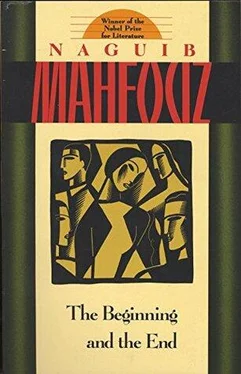Naguib Mahfouz - The Beginning and the End
Здесь есть возможность читать онлайн «Naguib Mahfouz - The Beginning and the End» весь текст электронной книги совершенно бесплатно (целиком полную версию без сокращений). В некоторых случаях можно слушать аудио, скачать через торрент в формате fb2 и присутствует краткое содержание. Год выпуска: 2016, Издательство: Anchor Books, Жанр: Классическая проза, на английском языке. Описание произведения, (предисловие) а так же отзывы посетителей доступны на портале библиотеки ЛибКат.
- Название:The Beginning and the End
- Автор:
- Издательство:Anchor Books
- Жанр:
- Год:2016
- ISBN:нет данных
- Рейтинг книги:4 / 5. Голосов: 1
-
Избранное:Добавить в избранное
- Отзывы:
-
Ваша оценка:
- 80
- 1
- 2
- 3
- 4
- 5
The Beginning and the End: краткое содержание, описание и аннотация
Предлагаем к чтению аннотацию, описание, краткое содержание или предисловие (зависит от того, что написал сам автор книги «The Beginning and the End»). Если вы не нашли необходимую информацию о книге — напишите в комментариях, мы постараемся отыскать её.
The Beginning and the End — читать онлайн бесплатно полную книгу (весь текст) целиком
Ниже представлен текст книги, разбитый по страницам. Система сохранения места последней прочитанной страницы, позволяет с удобством читать онлайн бесплатно книгу «The Beginning and the End», без необходимости каждый раз заново искать на чём Вы остановились. Поставьте закладку, и сможете в любой момент перейти на страницу, на которой закончили чтение.
Интервал:
Закладка:
“Good evening, Mr. Hassan,” came a voice in greeting.
Emerging from the mist of his thoughts, he raised his head to see Master Ali Sabri sitting in front of him, calm and proud.
“Good evening, Master,” Hassan cried, his heart full of delight.
The so-called master summoned the waiter and ordered a nargileh. Then he turned to Hassan.
“I have decided that we should work together. I want you to join my band,” he said at once.
Hassan’s eyes, opening wide, suddenly glistened. Working for the master’s music band was the only thing he liked, not because he was aesthetically disposed to this kind of work, but because it was light, pleasurable, and usually associated with the fragrance of liquor, drugs, and women’s perfume. Though he never expected much from Ali Sabri, he thought the offer was better than nothing. Perhaps it would lead to other things. Who could tell?
“Do you mean it, Master?” Hassan said.
“Sure.”
“Will we be working in a music hall or a café?”
“Maybe one day soon we’ll have a place at the broadcasting station. But for the time being, we’ll be playing at weddings,” the master said, passing his long, lean fingers through his unruly hair.
Hassan’s enthusiasm died. Had he been dealing with anybody other than Ali Sabri, on whom he still pinned some hope, he would have given him a stunning blow and sent him flying head over heels. He had actually worked with him at a few family parties in return for supper and a twenty-piaster piece, but only a few times a year. There was nothing new in this. Yet he felt a hidden motive behind this offer, and new hope stirred in his breast. He feigned delight.
“There is no doubt,” he said, “that you will one day occupy the place you deserve. Your voice is superior to that of Abdul Wahab himself.”
Ali Sabri grinned. “Which of the instruments of the band do you want to play?” he asked. “You told me that your late father was an excellent lute player.”
“I haven’t learned to play any instrument at all.”
“Not even the tambourine?”
“You tried me out as a Sannid, chanting refrains for you, and I think I’m the right man for the job.”
The master shook his head as he said, “As you like. Do you know many songs?”
“Yes. Mawawil, songs, and takatiqs. ”
“How about a solo right now?”
At bottom, Hassan felt disdain for the pomposity of his companion, but he was determined to go along with him to the end. He was dreaming of one day becoming an independent singer, even in low popular coffeehouses. He waited until the waiter came back with the nargileh and the master enjoyed his first puffs.
“What would you say to my singing the Mawal ‘My Eyes, Why Are You Weeping?’ for you?” Hassan asked with a cough.
“Excellent.”
As best as he could, Hassan began to chant the Mawal in a low voice, while the other man kept moving his head forward and backward, pretending to be absorbed in the song. When Hassan finished he said, “For a Sannid, that’s more than enough, but I should like to hear you singing Hank, too. Do you know the song ‘How I Waited When I Lost Your Love’?”
Hassan coughed again, clearing his throat, his enthusiasm grew, and he began to sing with more zest. He sang without a pause to the end.
“Excellent. Excellent. Do you know the basic tunes, Sica, Biati, Hijaz, and so on?” the master asked.
Sure of the master’s ignorance of those tunes, Hassan answered, with extraordinary daring that others rarely exhibited. “Of course.”
“Chant the Laiali ‘Rast’ for me.”
He chanted the first Laiali that came to his mind.
“Bravo. Chant another — a Nahawound,” Ali Sabri said, shaking his head.
Hassan continued to sing, suppressing a feeling of inward sarcasm. The other man was following him, feigning attention. Suddenly, he looked meditative and seemed to have something important to say. Instinctively, Hassan was waiting for this moment. Perplexed, he wondered whether Ali Sabri wanted to appoint him to lead a fight. What did he want precisely?
“Your voice is good enough. But working for the band requires other talents and skills. Here we must be in complete agreement. For instance, you should know all about propaganda methods, too,” the master said.
“Propaganda!”
“Yes. You should, for example, speak highly of my art whenever an occasion arises. You should also persuade people to ask me to sing at their marriage ceremonies. You will get your reward, of course. When you are at a songfest held by another singer, you should criticize his voice and tell everyone around you how wonderful Ali Sabri would have been if he had been singing instead, and so on.”
“That’s easy. You can expect even more,” Hassan said with a smile on his face.
Ali Sabri paused for a moment, and then said, “You are a strong and daring young man, and you should exploit your talents to the utmost. But let me ask you one more question. Which narcotic most appeals to you?”
Hassan wondered what made him ask such a question. Did he want to offer him a present? Impossible. He was always ready to accept presents, and generosity was certainly not part of his personality. Or was he seeking his collaboration on an important task? His heart fluttered at such a thought. He had long dreamt of trafficking in narcotics. Yet, he decided to be wary and on his guard.
“I think narcotics harm the throat,” he said slyly.
Ali Sabri laughed. With a thunderous and powerful voice, he started to sing a Laiali.
“What do you think of that singing?” he asked when he finished.
“Peerless.”
Ali Sabri went on to say, “This is what comes of fifteen years of addiction to hashish, opium, and manzoul, * and five years of taking cocaine as well.”
“You don’t say!”
“Narcotics are the very lifeblood of vocalizing. Any singer worthy of the name is as much addicted to drugs as he is to such basic foods as molokhiva and fool mudammis. ”
Hassan laughed. “Only if those drugs are available,” he said, surrendering.
“You are right. And it is as I thought. You don’t hate narcotics, but you have no access to them. Let me tell you, it is easy to turn rivers of water into rivers of wine, and mountains into mountains of hashish. You are both daring and strong. But I will be frank with you; I was very much afraid!”
“Of what?”
Ali Sabri gave a short laugh that revealed his yellow teeth. “Of all people,” he said, “I hate most those who say, ‘My morals won’t allow me to do this’ or ‘I have fear of God’ or those who fearfully ask, ‘What about the police?’ Now, are you one of them?”
Hassan smiled, feeling that he would be well rewarded for his long patience.
“I live in this world, assuming that there is no morality, God, or police,” he said.
Ali Sabri erupted in a powerful laugh that shook the café as much as his singing, and said, “Let’s spend the rest of the night at my place and continue our talk.”
Hassan agreed, hoping some profitable scheme would come of all this. His confidence never failed him for a single moment, but he had little faith in his interlocutor. However, he had not quite given up hope in him. Deep down, he felt that he would have to wait a long time before the earth, shaking underneath his feet, became stable once more.
*A cheap mixed drug.
THIRTY-TWO
Content with the light that shone from Hussein and Hassanein’s room, Nefisa and her mother were sitting in the hall when their friend and landlady paid them a visit. As befitted someone who had done such important services for Nefisa, they welcomed her warmly. She installed herself on the sofa between the two women and insisted that they need not turn on the hall light. She and Samira entertained themselves with conversation while Nefisa went to the kitchen to make some coffee for their guest.
Читать дальшеИнтервал:
Закладка:
Похожие книги на «The Beginning and the End»
Представляем Вашему вниманию похожие книги на «The Beginning and the End» списком для выбора. Мы отобрали схожую по названию и смыслу литературу в надежде предоставить читателям больше вариантов отыскать новые, интересные, ещё непрочитанные произведения.
Обсуждение, отзывы о книге «The Beginning and the End» и просто собственные мнения читателей. Оставьте ваши комментарии, напишите, что Вы думаете о произведении, его смысле или главных героях. Укажите что конкретно понравилось, а что нет, и почему Вы так считаете.












